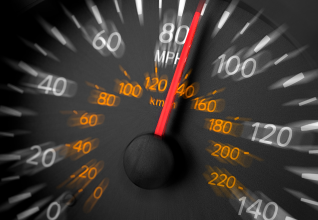Speeding is a major concern on Irish roads, significantly impacting road safety and contributing to accidents and fatalities. Research indicates that 10-15% of all road collisions, and 30% of all fatal collisions, are a direct result of speeding or inappropriate speed.
With speed being such as a significant factor in road collisions and accidents, it’s crucial to highlight the importance of driving at an appropriate speed for the situation and obeying posted speed limits. Let’s explore why managing your speed is essential, understand the legal requirements, and learn ways to manage your speed and keep our roads safe.
Importance of Speed Awareness

Excessive speeding is a dangerous yet common behaviour on Irish roads. Driving too fast can have a massive impact on your ability to control your vehicle and reaction to unexpected situations, results in increased stopping distances, and drastically increases the severity of collisions.
Excessive speeding is a dangerous yet common behaviour on Irish roads. Driving too fast can have a massive impact on your ability to control your vehicle and reaction to unexpected situations, results in increased stopping distances, and drastically increases the severity of collisions.
Why Speed Awareness Matters:
Speeding is driving at an excessive speed, or at a speed that is higher than the maximum allowed by law. It is a dangerous driving behaviour and often an aggravating factor in collisions and road traffic accidents.
Additionally, inappropriate speed, or driving at too high a speed given the traffic situation, infrastructure, weather conditions, and/or other circumstances is also seen as a problem for road safety.
Driving at a safe and appropriate speed is an important aspect of road safety and plays a crucial role keeping other motorists and pedestrians safe on the roads, such as:
- Accident Risk: The Higher the speed, the greater the consequences. Speeding makes accidents more likely and also more severe. With research showing that a pedestrian who is hit by a car travelling at 65km/h is four times more likely to be killed compared to a car travelling at 50km/h.
- Vehicle Control: Maintaining the correct and appropriate speeds means you have better vehicle control, especially in adverse weather conditions.
- Visibility & Reaction: Driving at slower speeds improves your ability to see potential dangers, and allows you to react quickly to hazards on the road.
Legal Requirements for Speeding in Ireland
Ireland takes speeding seriously, with strict legal consequences for those caught driving above the posted speed limit. Being aware of these laws can help you avoid hefty fines and other penalties.
Penalties for Speeding Offences:
- Fines: If you are caught driving over the speed limit, you can expect a fixed charge fine of €160. This will increase to €240 if not paid within 28 days. Failure to pay the second fine within 28 days (56 days of the initial fine) will result in a court summons and potential fines of up to €1,000. However, you can avoid this outcome by paying €320 (twice the sum of the original fine) no later than 7 days before your specified court date.
- Penalty Points: Being caught driving over the speed limit will result in 3 penalty points being added to your licence. This can increase to 5 points on conviction in court. Accumulating penalty points can lead to higher insurance premiums and, potentially, the loss of your driving licence.
- Disqualification: Severe or repeated speeding offences can result in disqualification from driving.
Speed Cameras and Enforcement Measures
Speed cameras are a key tool in enforcing speed limits and keeping the roads safe. They act as a deterrent against speeding and also help in identifying offenders.
Typically, the average speed camera uses what’s called Automatic Number Plate Recognition (ANPR) technology to read the number plate of every vehicle which passes its field of view, and creates a unique time, date and location stamp for each.
When a vehicle reaches the next camera too quickly, the number plate will be flagged as having committed a speeding offence. The information is then sent back to be processed.
Effective enforcement through speed cameras and other measures helps reduce these risks by encouraging drivers to maintain safe speeds.
Speed Limits in Ireland
Ireland has different speed limits for various types of roads. Speed limits are carefully set based on the road type, traffic density, and other location and environmental factors to ensure the safety of all road users and pedestrians.
Overview of Speed Limits in Ireland:
- Urban Areas: Typically set at 50 km/h, these limits are in place to protect pedestrians, cyclists, and other road users in busy areas.
- National Primary Roads: The standard speed limit for national primary roads, roads that connect major urban centres, is set at 100km/h.
- National Secondary Roads: The standard speed limit for secondary roads in Ireland is 80 km/h. Secondary roads types carry more traffic than local roads but are secondary to primary roads.
- Rural Roads: The updated speed limit for rural roads is 60 km/h, reduced from 80km/h as of February 2025.
- Motorways: The standard speed limit on motorways is 120 km/h, allowing for safe and fast travel over longer distances.
Effective from February 7th, 2025, some significant changes to speed limits came into place for rural local roads in Ireland with the speed limit reduced from 80 km/h to 60 km/h.
Rural, local roads or L Roads are any roads that are not motorways, national roads or regional roads and generally connect smaller villages, towns or residential/agricultural properties. These roads with start an L and have four- or five-digit route numbers (e.g. L1234), and tend to be narrower and in poorer conditions compared to primary and secondary roads.
While rural roads often have lower traffic volumes, research shows that almost three in four road deaths (73%) reported in Ireland from 2020-2024 occurred on a rural road with a speed limit of 80km/h or greater.
These changes are part of a broader government initiative to improve safety and reduce accidents, particularly in rural areas where road conditions can be more unpredictable.
Motorists can also expect further speed limit updates to come into place in 2025 affecting urban areas and secondary roads across the country.
The speed limit in urban zones will see a reduction from 50km/hr to 30 km/h; the speed limit on Ireland’s secondary roads are set to see a reduction from 100 km/h to 80 km/h later in 2025.
The changes to speed limits across the country are being implemented as part of the Road Safety Strategy 2021-2030, the Irish government’s plan to improve safety and reduce serious injuries and fatalities on Irish roads.
Technology & Speed Monitoring
Modern car technology plays a significant role in monitoring and managing vehicle speeds, contributing to safer driving practices.
Speed Monitoring Tools:
- Speed Cameras: As mentioned above, speed cameras are used to automatically detect and record vehicles exceeding speed limits, issuing fines to offenders. These act as a deterrent from speeding.
- Speed Limiters: Most modern cars come with devices called speed limiters installed. These can be set to a maximum speed (for example, 80km/hr) and ensure drivers do not exceed the set limit.
- GPS-Based Systems: Many vehicles also now come equipped with GPS that can alert drivers to speed limit changes. This can help drivers to maintain appropriate speeds by reducing human error.
Reducing Speeding Risks
Adopting proactive strategies can significantly reduce the risks associated with speeding. Here are some effective techniques to help you stay within speed limits and drive safely.
Defensive Driving Techniques:
- Stay Focused: Always keep your focus and attention on the road and avoid distractions to better manage your driving speed.
- Anticipate Hazards: Look ahead to identify potential obstacles or changes in traffic flow. This should allow you to adjust your speed accordingly and reduce your overall risk.
- Use Mirrors Effectively: Regularly check your mirrors to stay aware of surrounding traffic and adjust your speed as needed.
Utilise Cruise Control:
- Maintain Consistent Speed: Cruise control can help you keep a steady speed on long drives, preventing unintentional speeding.
- Reduce Fatigue: By maintaining a constant speed, cruise control can help reduce driver fatigue, especially on motorway journeys.
Staying Updated:
- Check Speed Limit Changes: Road conditions and regulations can change, so it’s important to stay informed about current speed limits, especially when driving in unfamiliar areas.
Looking to Save On Your Car Insurance?
At KennCo, our car insurance cover offers competitive rates and valuable benefits, including a replacement car as standard. Get peace of mind knowing you’re fully covered.
Get a Secure Quote Today
This post was originally part of our Irish Road Safety Week 2024 campaign series.
